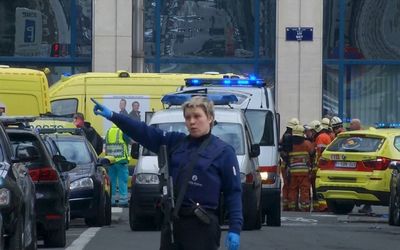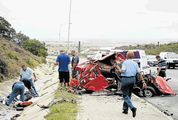THE fallout from the Islamic State-claimed attacks in Brussels is all bad and certain to get worse, writes Time magazine in its latest issue.
But in the aftermath of last week’s terror attacks, the question has to be what can be done to prevent the spiral of violence inspired by the Islamic State (IS) across Europe.
The death toll from the bomb attacks in Brussels last Tuesday has risen to 35, with four more people in hospital. Belgium’s security services have been criticised heavily for their failure to intercept and stop the bombers, given that Brussels had been expected to be next after the November attacks in Paris. Those attacks were revealed to have been planned in Belgium, with the two brothers Abdesalam, from the Brussels district of Molenbeek, named as ringleaders.
The second of those brothers was arrested just days before the Brussels attack. And a trail of instances of incompetence on the part of intelligence and police services has emerged, with Turkey having warned the Belgians about at least one of last week’s bombers, whom Turkey deported back to Belgium when he was caught on his way back from Syria not long ago.
Belgium’s interior minister Jan Jambon has admitted to "inexcusable" blunders such as ignoring the information from Turkey. But increasingly, the indications are that the failure to take seriously IS’s intentions in Europe is not just the fault of one or two target countries, but a failure of Europe’s governments and security agencies more generally.
As IS has been pushed back in Syria and Iraq, it has increasingly turned to attacks in the West. An article in the Financial Times speaks of "a sprawling terror network IS has been shaping for years". Because jihadist cells appeared to operate relatively independently, and there was little evidence of structured plots from Syria and Iraq, western intelligence assessments for months misjudged IS’s ambitions and the resources it was putting into hitting the West.
"By the time European spy agencies began viewing IS as a far more dangerous domestic adversary, the jihadis were months into the construction of networks within the EU’s borders," argues Sam Jones of the Financial Times.
Clearly, the first line of defence against the attacks is to strengthen the will and the capacity of national security agencies to detect and police these networks. Belgium’s security infrastructure seemed particularly dysfunctional and ineffectual, but the IS cells will surely have been exploiting the dysfunctional relationships that exist between agencies of the European countries, as well as taking advantage of the free movement between countries.
The priority then is to enhance pan-European co-operation and intelligence gathering, and co-ordination between security agencies and governments. And immediate, collaborative action is needed to uncover the networks and try to halt further attacks.
A second area for action is to tackle the IS threat at source in Syria and Iraq — as the US has been doing with the killings in recent days of two senior IS leaders. This is no quick or easy fix though, and in the short term, it could make the terror threat worse. The third and most fundamental challenge is to attend to the socioeconomic failures that make poor districts such as Molenbeek such fertile ground for the terror group to recruit and to radicalise disaffected young people.
Most of those involved in the Brussels and Paris bombings were not migrants. They were EU citizens, often third or fourth generation offspring of North African migrants who came to Europe as cheap labour — but who countries such as Belgium and France have done a poor job of integrating into their economies or the social fabric.
Molenbeek has an unemployment rate of 40% and high rates of crime and drugs. Belgium is per capita Europe’s largest contributor of fighters to Syria and Iraq.
If these countries want to halt terror in the longer term, they will have to do a lot more to integrate young people from diverse backgrounds and build social cohesion.
The lessons apply as much to SA as they to for Europe.

A police woman gestures in front of ambulances at the scene of a blast outside a metro station in Brussels, in this still image taken from video on Tuesday. REUTERS/REUTERS TV
THE fallout from the Islamic State-claimed attacks in Brussels is all bad and certain to get worse, writes Time magazine in its latest issue.
But in the aftermath of last week’s terror attacks, the question has to be what can be done to prevent the spiral of violence inspired by the Islamic State (IS) across Europe.
The death toll from the bomb attacks in Brussels last Tuesday has risen to 35, with four more people in hospital. Belgium’s security services have been criticised heavily for their failure to intercept and stop the bombers, given that Brussels had been expected to be next after the November attacks in Paris. Those attacks were revealed to have been planned in Belgium, with the two brothers Abdesalam, from the Brussels district of Molenbeek, named as ringleaders.
The second of those brothers was arrested just days before the Brussels attack. And a trail of instances of incompetence on the part of intelligence and police services has emerged, with Turkey having warned the Belgians about at least one of last week’s bombers, whom Turkey deported back to Belgium when he was caught on his way back from Syria not long ago.
Belgium’s interior minister Jan Jambon has admitted to "inexcusable" blunders such as ignoring the information from Turkey. But increasingly, the indications are that the failure to take seriously IS’s intentions in Europe is not just the fault of one or two target countries, but a failure of Europe’s governments and security agencies more generally.
As IS has been pushed back in Syria and Iraq, it has increasingly turned to attacks in the West. An article in the Financial Times speaks of "a sprawling terror network IS has been shaping for years". Because jihadist cells appeared to operate relatively independently, and there was little evidence of structured plots from Syria and Iraq, western intelligence assessments for months misjudged IS’s ambitions and the resources it was putting into hitting the West.
"By the time European spy agencies began viewing IS as a far more dangerous domestic adversary, the jihadis were months into the construction of networks within the EU’s borders," argues Sam Jones of the Financial Times.
Clearly, the first line of defence against the attacks is to strengthen the will and the capacity of national security agencies to detect and police these networks. Belgium’s security infrastructure seemed particularly dysfunctional and ineffectual, but the IS cells will surely have been exploiting the dysfunctional relationships that exist between agencies of the European countries, as well as taking advantage of the free movement between countries.
The priority then is to enhance pan-European co-operation and intelligence gathering, and co-ordination between security agencies and governments. And immediate, collaborative action is needed to uncover the networks and try to halt further attacks.
A second area for action is to tackle the IS threat at source in Syria and Iraq — as the US has been doing with the killings in recent days of two senior IS leaders. This is no quick or easy fix though, and in the short term, it could make the terror threat worse. The third and most fundamental challenge is to attend to the socioeconomic failures that make poor districts such as Molenbeek such fertile ground for the terror group to recruit and to radicalise disaffected young people.
Most of those involved in the Brussels and Paris bombings were not migrants. They were EU citizens, often third or fourth generation offspring of North African migrants who came to Europe as cheap labour — but who countries such as Belgium and France have done a poor job of integrating into their economies or the social fabric.
Molenbeek has an unemployment rate of 40% and high rates of crime and drugs. Belgium is per capita Europe’s largest contributor of fighters to Syria and Iraq.
If these countries want to halt terror in the longer term, they will have to do a lot more to integrate young people from diverse backgrounds and build social cohesion.
The lessons apply as much to SA as they to for Europe.





















Change: 1.37%
Change: 1.32%
Change: 2.91%
Change: 0.45%
Change: 3.09%
Data supplied by Profile Data
Change: 1.59%
Change: 0.47%
Change: 1.37%
Change: 0.00%
Change: 0.44%
Data supplied by Profile Data
Change: 0.22%
Change: -0.05%
Change: 0.04%
Change: 0.23%
Change: 0.00%
Data supplied by Profile Data
Change: 0.26%
Change: 0.31%
Change: 0.13%
Change: 0.36%
Change: -0.74%
Data supplied by Profile Data